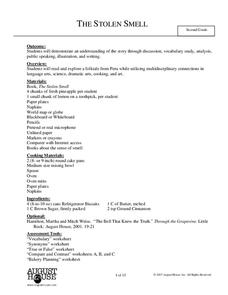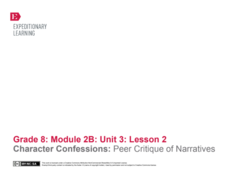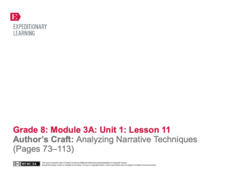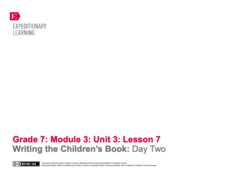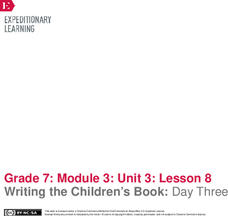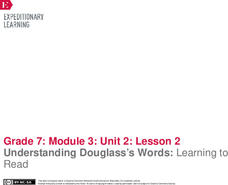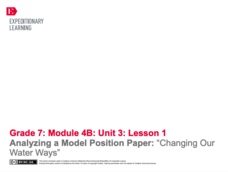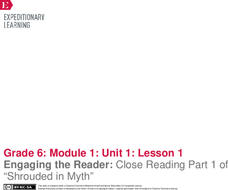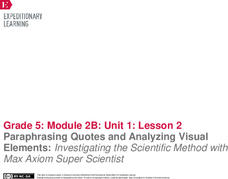EngageNY
Drafting a Historical Fiction Narrative: The Wheelwright
Young writers use the four-square graphic organizer to draft their historical fiction narratives' first, second, third, and fourth paragraphs on the wheelwright. The instructional activity promotes discussion and modeling of what makes a...
Curated OER
Night Here, Day There
Explore astronomy with a lab sheet for fifth grade scientists. After reading a short explanation about the earth's rotation, they solve a word problem about the differences in times across the world. Next, they make a model of the solar...
National Security Agency
Awesome Area - Geometry and Measurement
Break out those math manipulatives, it's time to teach about area! Capturing the engagement of young mathematicians, this three-lesson series supports children with learning how to measure the area of squares, rectangles, and other...
Curated OER
Go To Sleep, Gecko!
Second graders examine the interdependence of organisms using the book "Go To Sleep, Gecko!" They examine a variety of food chains, listen to the book, and answer story comprehension questions. Students then conduct research on food...
Curated OER
The Stolen Smell
Second graders read the story The Stolen Smell and participate in many language arts based activity connected to the story. They participate in discussions, vocabulary work, analyzing the story, public speaking, illustrating pictures,...
Curated OER
Compound Words - Two Words In One
Compound words sure do come in handy! For young readers, learning how two words can go together to make one word is a big deal. It's also a confidence builder because they are suddenly able to read "big" words. This sweet presentation...
EngageNY
Character Confessions: Peer Critique of Narratives
Shake up the writing process with a peer critique. The second of four lessons in the Grade 8 ELA Module 2B, Unit 3 series first has young writers compare their interpretations of a scene from William Shakespeare's A Midsummer Night's...
PBS
Reading Adventure Pack: Rocks
A Reading Adventure Pack focuses on rocks. Scholars participate in three activities after reading a fiction and nonfiction text—The Jade Stone, a Chinese folktale adapted by Caryn Yacowitz, and Rocks in His Head by Carol Otis Hurst....
EngageNY
Planning Ideas: Developing a Colonial Character Profile
The second lesson in a historical fiction series encourages pupils to develop a character profile of a colonial person using research acquired in the previous unit. Learners prepare their historical fiction narrative by responding to a...
EngageNY
Inferring about Character: Close Reading of the Poem “Inside Out” and Introducing QuickWrites
Grab a partner! Scholars partner up to take a second look at the verse novel Inside Out & Back Again. They discuss questions about and connections to the novel and then learn how to complete a Quick Write task properly. To finish,...
EngageNY
Analyzing the Model Essay: Studying Argument (Chapter 27 Plus Synthesis of Scenes in Previous Chapters)
Scholars partner up to review a model essay and talk through the process leading up to writing their essays. During a second reading of the essay, learners locate and underline the claim given, reasons, and counterclaim. They then...
EngageNY
Author’s Craft: Analyzing Narrative Techniques (Pages 73–113)
Scholars discuss a reading selection in Unbroken by writing to a partner about text selection. After completing the writing, learners revisit the use of active and passive sentences by reviewing a second Active and Passive Sentences...
EngageNY
Writing the Children’s Book: Day Two
Following a brief mini-instructional activity on using dialogue in fiction, young writers continue day two of their writing workshop. They work on the second half of their Children's Book Storyboards, and then they turn and talk with...
EngageNY
End of Unit Assessment and Independent Reading Review
Reader, writer, illustrator ... scholars wear many hats! Pupils become experts in recommending books to their classmates as they write reviews of their independent reading books. Next, after finishing the second draft of their children's...
EngageNY
Writing the Children’s Book: Day Three
Illustrations are a key feature of children's books. Using the resource, pupils learn about adding illustrations to their children's books. Next, as they complete their storyboards and work on their second drafts, they consider their...
EngageNY
Close Reading Excerpt 2: Plantation Life
Time for a good old fashioned match game! Readers complete an initial, second, and third read of Plantation Life to gain a deep understanding. After close reading the text, scholars practice identifying paraphrasing by...
EngageNY
Understanding Douglass’s Words: Learning to Read
How is a sentence like the human body? Scholars think about the comparison as they view an image of the human anatomy and begin to complete an Anatomy of a Sentence anchor chart. They review roots, prefixes, and suffixes and then begin...
EngageNY
Analyzing a Model Position Paper: “Changing Our Water Ways”
Follow the leader for better writing! Scholars analyze a model position paper, "Changing Our Water Ways." During the first pass, they listen as the teacher reads the paper aloud. They then do a second read of the paper and complete a...
EngageNY
Engaging the Reader: Close Reading Part 1 of “Shrouded in Myth”
Read and reread for better understanding. Scholars listen to a read aloud of Shrouded in Myth. They talk with a partner about the things they noticed and wondered about the text. They then listen to the text a second time to focus...
EngageNY
Connecting the Theme of the Expert Group Myth to a Theme in The Lightning Thief and to Life Lessons
Expert groups discuss the theme of their myths and the life lessons people learn from it. They then regroup their triads so that there is a pupil from each expert myth group and share details about their myths. The class also talks about...
EngageNY
Informational Text Features: Analyzing “Hawaii’s Endangered Happy Face Spider”
Some things are better the second time around. Scholars reread an article about Hawaii's happy face spider, answering text-dependent questions as they read. Then, they use a Venn diagram to compare the text features of interviews and...
EngageNY
Close Reading: Blue Creek, a Rainforest in Belize (Page 12)
Peace and quiet. After reading page 12 of The Most Beautiful Roof in the World, scholars participate in a silent conversation with a chalk talk activity. They take turns describing how the rainforest is diverse by writing on chart...
EngageNY
Paraphrasing Quotes and Analyzing Visual Elements, Part 3: Investigating the Scientific Method with Max Axiom Super Scientist
Come again? Scholars repeat actions taken in the last two lessons using section 3 of Investigating the Scientific Method with Max Axiom Super Scientist. They first read the section to determine the gist and then carry out a second read...
EngageNY
Paraphrasing Quotes and Analyzing Visual Elements: Investigating the Scientific Method with Max Axiom Super Scientist
Pay close attention. Learners discuss the things close readers do and record them in a chart. They then silently reading section 1 of Investigating the Scientific Method wit Max Axiom Super Scientist and write the gist of the text in...
Other popular searches
- Second Grade Language Arts
- Second Grade Story Maps
- Second Grade Weather Unit
- Second Grade Money Lessons
- Plane Geometry Second Grade
- Second Grade Abc Order
- Decoding Skills Second Grade
- Second Grade Story Summary
- White House Second Grade
- Fitness Goals Second Grade
- Centimeter Second Grade
- Second Grade Proper Nouns




